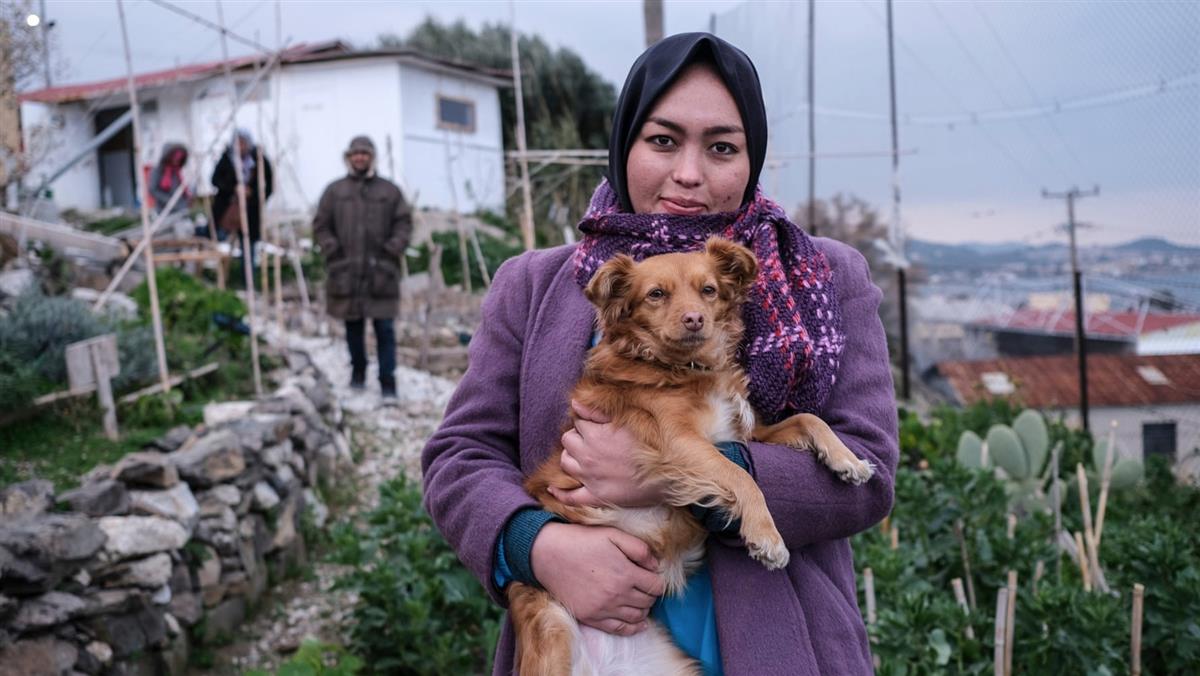 Green shoots ... Sima Mohammedi, 26, a refugee volunteer from Afghanistan, in a garden at the One Happy Family community centre near Moria. Photograph: Byron Smith/Getty Images
Green shoots ... Sima Mohammedi, 26, a refugee volunteer from Afghanistan, in a garden at the One Happy Family community centre near Moria. Photograph: Byron Smith/Getty Images
Sam Wollaston
@samwollaston
The refugee camp is notorious for its overcrowding, fires and riots. But for the people who live there, life goes on – and every day brings new stories of resilience, bravery and compassion
It is not easy to find the library at Moria on the Greek island of Lesbos. Before reaching the refugee camp’s main entrance, you turn off the road where the police bus is always parked, then walk up the track that runs beside the perimeter fence. You walk past the military post and the hawkers selling fruit and veg, trainers, cooking utensils, cigarettes, electrical equipment – pretty much everything; past huge stinking mountains of bagged-up rubbish – so much rubbish; and past the worst toilets in the world, overflowing with excrement and plastic.
Then, opposite the hole in the fence where people who don’t want to use the main gate come and go, you turn right, into what they call the Jungle, the olive groves into which the camp has exploded, because it was meant for 3,000 people and now has 20,000. Continue along the winding path, watching out for low-slung washing lines, past the burnt-out olive tree and the tiny tent with the family who always say hello, then turn left up the steep hill that becomes a muddy slide after rain. And there it is, on the right: Moria’s new library.
From the outside, it looks like all the other structures in this part of the camp – a shack cobbled together from bits of wood and tarpaulins. But inside there are shelves and books. And, standing behind a counter, wearing a New York Yankees beanie, a librarian – Zekria, from Afghanistan.
He runs a school, too – that is how the library started. Zekria, 40, his wife and their five children arrived on the island a year ago in the usual perilous way, in a small boat at night across the 12-mile strait from Turkey. He tried to register the kids at one of the NGO-run schools that provide some educational activities, but they were all full; the waiting list could have been a month, two months, three months.
So Zekria, who used to teach law at a university in Kabul, decided to start his own class. “I bought a whiteboard and some markers. It started in an open area under an olive tree last March, teaching English,” he says. “English is the most important, because, even though people get stuck here for a year, two years, more even, no one wants to live here for ever.” He speaks excellent English, softly.
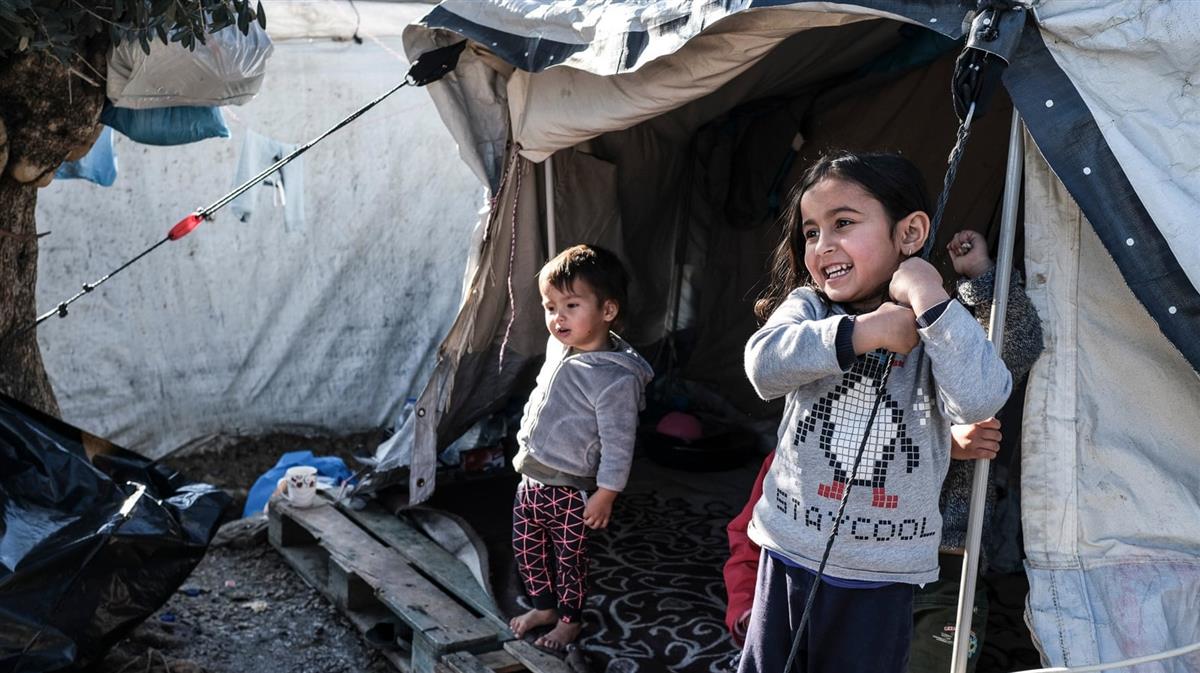 ‘Everyone – especially children – needs hope’ ... young refugees on the outskirts of Moria. Photograph: Byron Smith/Getty Images
‘Everyone – especially children – needs hope’ ... young refugees on the outskirts of Moria. Photograph: Byron Smith/Getty Images
More and more people – mostly Afghans, but also Syrians, Iraqis and members of other nationalities – wanted classes. Zekria was invited to people’s tents and containers to teach; soon he had more potential students than he could cope with. So he set up a team and they built a classroom. Registration opened one Friday morning. “When I came here at 7.30am, more than 600 people were in the line.”
They scheduled lessons for everyone: no one gets turned away, even if it means 50 to a class. “We cannot say no,” says Zekria. As if to prove it, 14-year-old Somahya shows up to register for German lessons (her family is trying to get to Germany) and is told there will be a class available by next week.
Now there are three classrooms and the teaching team numbers 30, with more than 1,000 students learning English, German, French and Greek, guitar and art. In the room next to the library, a class mostly of teenagers is painting designs on T-shirts on the floor. “It’s very important for people living in this stressful place,” says Zekria. “They come here, paint or listen to music, they learn something, they’re busy, they forget the other traumatic stuff they suffer in this camp. Psychology starts in action. Doctors will advise, but we are doing it in action.”
The library is the latest project. Zekria hasn’t quite worked out the system yet. It doesn’t officially open until tomorrow. He thinks it is going to be one book borrowed at a time, maybe two if users travel a long distance within the camp. They will be able to keep items for a week, maybe 10 days. So far, books have mostly been donated by aid workers and NGOs, some possibly more pertinent (Catch-22) than others (the Lonely Planet guide to China). Zekria would like more books in Farsi and Arabic. I have only one book with me, a new one by the film-maker Chris Atkins about his time banged up in Wandsworth prison in London. That could be relevant, I guess. Anyway, it is there now, in the library at Moria.
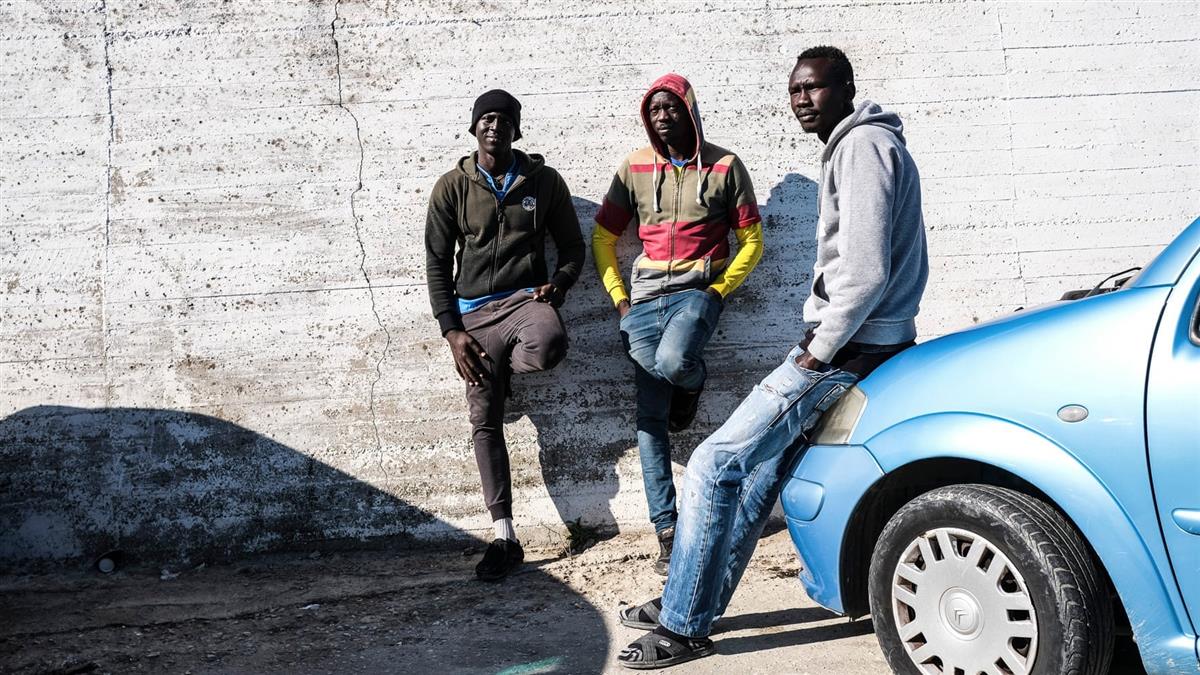 Humanity survives in hell ... South Sudanese migrants outside Moria. Photograph: Byron Smith/Getty Images
Humanity survives in hell ... South Sudanese migrants outside Moria. Photograph: Byron Smith/Getty Images
Zekria’s own sentence – and his family’s – is further uncertainty. Their asylum application has been rejected. He doesn’t know why, but suspects it may have something to do with this educational activity. The authorities don’t like it, he says.
***
I have come to Moria on the hunt for hope. It began with a letter to the Guardian from an aid worker there. He was concerned that the notorious camp’s portrayal in the media was relentlessly negative. But working there, he said, was an amazing experience; every day, he witnessed acts of kindness by extraordinary people. It gave him faith in humanity.
You will have heard about the desperate conditions, the overcrowding, the fires, the riots, the unaccompanied minors, the trauma, sexual exploitation, rape and murder. I am here to see if there is another, more positive side to Moria.
Bloody hell, that looks unlikely. “Moria no good,” is the chorus to my time at the camp. The same issues come up again and again: the fear and the cold at night, freezing showers, the unreliable supply of water, no electricity, queueing for hours for food, for months, years or for ever for permission to leave the island. Then there are the fights that break out among the frustrated, angry, bored young men who make up a high proportion of those living here. Just before my arrival, a 20-year-old Yemeni man was fatally stabbed, the second death this year. No one came here for this.
Moria is hell, a stain on 21st-century Europe, where bureaucracy, politics and simply not caring enough have left tens of thousands in limbo – people fleeing war and danger, looking for a future for themselves and their children and not finding it. Moria’s existence is a disgrace, a failure of morality.
Yet, somehow, a sort of life goes on; humanity survives in hell. I am here for three days – two alone, then another with the photographer Byron Smith – and experience so much goodwill and humour.
I am offered warm flatbread fresh from one of Moria’s many ovens, sunflower seeds from kids, shisha from a bunch of Iraqi lads standing around a fire. Language is sometimes a problem, but it turns out it is possible to discuss the demise of Manchester United through sign language. There are more people here from Afghanistan than from any other country and I end up talking to more Afghans than anyone else, but I also meet people from Iraq, Syria, Somalia, Burkina Faso, Guinea-Bissau, South Sudan, Nigeria, Burundi, Zimbabwe and even Myanmar.
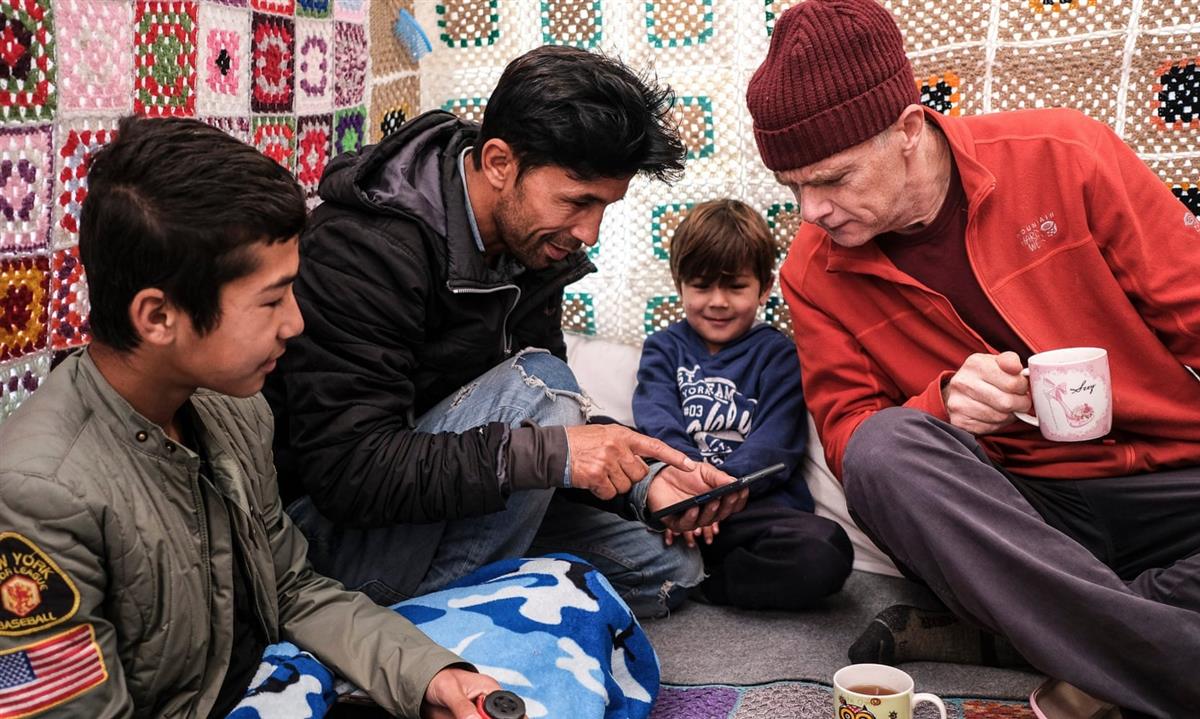 Abdullah Najafi (second left), from Afghanistan, and two of his children – Mohammad (left), 14, and Meraj, five – show photos and share tea with Sam Wollaston inside their tent. Photograph: Byron Smith/Getty Images
Abdullah Najafi (second left), from Afghanistan, and two of his children – Mohammad (left), 14, and Meraj, five – show photos and share tea with Sam Wollaston inside their tent. Photograph: Byron Smith/Getty Images
There is no power to make coffee or tea in Wahid Amini’s store today, but he has cold drinks. A cameraman back in Kabul, Wahid, 20, is trying to join his family in France, but his application has been rejected. He is hopeful that, with legal help and more documentation, he might get there one day. The shop, next to a busy barber’s, is a new enterprise, to try to make a bit of money. He sells shampoo, rice, spaghetti, washing-up liquid, disposable razors, etc, which he buys outside the camp. He is open 24 hours.
The Najafi family – Abdullah and Gulbdan, plus their sons Ali Reza (15), Mohammad (14) and Meraj (five) – invite us into their homemade tent. It is tiny for five people – six, actually; their 16-year-old daughter, Faezh, has gone to queue for a cold shower. But it is spotless and tidy – blankets have been folded and piled up for the day – and we leave our muddy shoes at the entrance. The family’s belongings hang in rucksacks from the wall, next to the Afghan flag and a couple of soft toys, one of which looks like a Kevin the Carrot from Aldi. I really hope it is one of the Kevins I recently sneaked into the charity-shop bag at home.
Gulbdan must know of a secret power source, as she conjures up an electric kettle and hot water to make tea, served in cracked cups with almonds and biscuits. Touching hospitality in any circumstance; properly moving in Moria.
Mohammad shows me footage on his dad’s phone of him taking part in a karate tournament in Iran. Abdullah and Gulbdan left Afghanistan 20 years ago; the kids have been brought up in Iran until now. Mohammad, already a black belt, won his bout. There is no karate in Moria, just actual fighting. The Najafi family keep to their tent after dark.
They show us pictures on Faezh’s camera of some of their journey. Playing on a beach in Turkey, rock pools, jellyfish. She didn’t take pictures of the crossing – it was too dark and too scary – but there is a little video of them on the beach where they landed in the north of Lesbos, looking tired but happy, in Europe at last. They never imagined they would end up like this.
One boy gave me a pair of socks. He said: ‘At Christmas, in your country, you give presents to the people that you love’ Eleni Dimou
There is plenty of humanity on show from the aid workers. Kind Danish women distribute clothes; a group of Dutch Christians hand out boxes of toys; a middle-aged British man with a background in water engineering leads a team to maintain the camp’s showers, toilets and sewers. There are hundreds of mostly young volunteers, who consider Moria unacceptable and Europe’s shame. They are not indifferent: they want to make a difference. I meet many who came for a few weeks and ended up staying for a year, sometimes two.
One Happy Family is, as you might expect from its name, good news. A community centre a few miles from the camp, run by various organisations along with many refugee volunteers, it has a medical centre, a playground, a gym, a women’s space, a cafe, board games, a phone-charging station and an electrical repair shop. There is also a garden, where refugee volunteers including Sima Mohammedi and Reza Rezaie show me the beetroot, spinach, turnips, chard, beans and herbs they are growing. Covering the compost heap is a big piece of black rubber, just recognisable as part of one of the dinghies that bring refugees from Turkey and then get abandoned. Recycling.
The vegetables contribute to the OHF kitchen, where they cook lunch for up to 1,200 people every day. Today’s chefs are Fifie from Zimbabwe and Mohammed from Myanmar. They are cooking vegetables, lentils, chickpeas and flatbread. Once a week they do chicken – and the queues get really long.
Back at Moria, it is hard not to meet Ali Shama Eddin. He must be the most famous and is certainly the tallest person here. Ali, 23, from Damascus in Syria, arrived in Moria in 2016. He was alone: his parents had already reached Germany – but that helps your case only if you are a minor. He started helping, volunteering with the Dutch organisation Movement on the Ground, and learned English from hanging out with the Europeans he worked with.
It took Ali almost two years, but he got his travel documents eventually and went to Germany to join his family. “But my heart, my mind, my feelings were here, so I decided to come back,” he says. Now he works here, as the general manager for the same NGO, Movement on the Ground. He strides about the place in his bright yellow jacket, greeting everyone in several languages, trying to sort out people’s problems, finding room in a tent for a new arrival. “I understand – I’m a refugee as well,” he says.
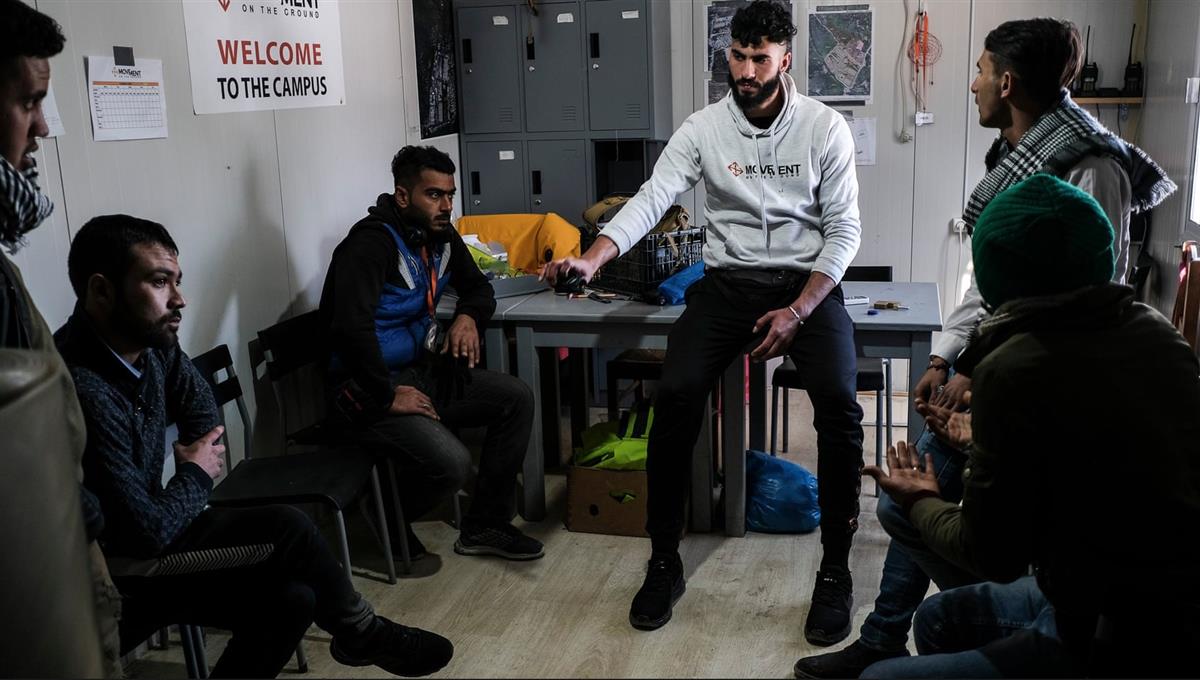 ‘I understand – I’m a refugee as well’ ... Ali Shama Eddin, from the charity Movement on the Ground, mediates a dispute in the camp. Photograph: Byron Smith/Getty Images
‘I understand – I’m a refugee as well’ ... Ali Shama Eddin, from the charity Movement on the Ground, mediates a dispute in the camp. Photograph: Byron Smith/Getty Images
When there is a dispute between two men, one of whom says the other owes him money, Ali sits them down to try to sort it out. “I want to hear from both of you to understand how we can solve this problem,” he tells them. This one doesn’t end in a fight – for now.
“There is love and communication between people from different countries – we can all be together, share a meal, discuss something. We can learn from each other, inspire each other, support each other. This is amazing,” says Ali, who is very much on board with the NGO’s ethos, which is all about treating people with dignity and respect and empowering them.
Who is this European woman, who looks a bit like Johan Cruyff and smokes like him, too? Ah, Susila Cruyff, the daughter of the footballer. She is here with the Cruyff Foundation, which develops sports activities for children in need around the world. Nowhere are kids more in need than here. The foundation is going to build a football pitch – a Cruyff court – in the camp and Susila is here to look for a suitable site. At the moment, there is nowhere flat in camp to kick a ball. “My father used to think that sport is more than sport,” she says. “It’s good for your health, but also for your mental health,” she says.
The foundation will build two pitches: one here, one somewhere else on the island for the locals – the hope being that it will encourage competitions and build bridges between refugees and residents. The relationship between the two has been far from easy.
***
“They steal, they fight, they don’t respect us,” says Sofia, my taxi driver from the airport. Tourists no longer come; Lesbos is now an “Islamic place”, she says.
There are about 25,000 refugees on an island with a permanent population of 86,000. That is an increase of almost 30% (think of 19 million people suddenly showing up in the UK). It has put a massive strain on the island’s resources: water, services, the hospital. Ambulances are frequent visitors to Moria’s main gate; I see a woman in labour and obvious pain being lifted into one. She will be back within a couple of days with Moria’s youngest resident.
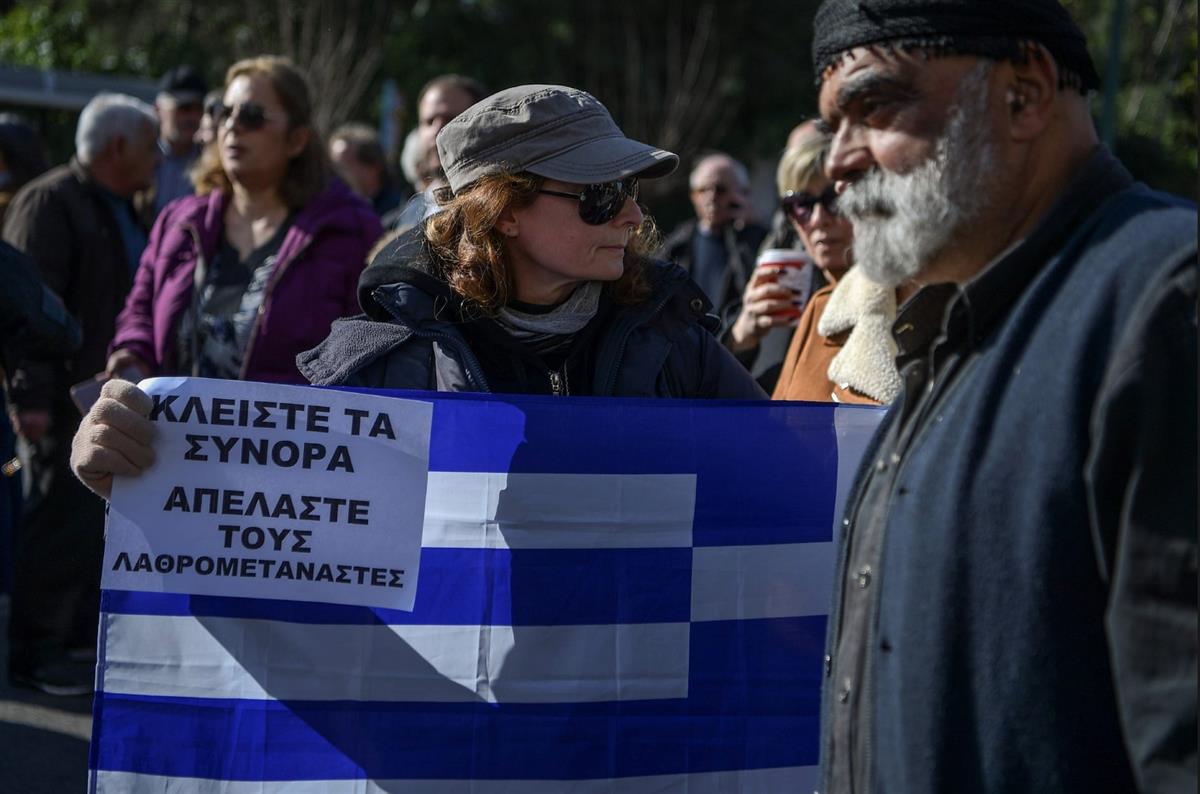 ‘Close the borders’ ... a woman holding a Greek flag protests against the country’s refugee camps. Photograph: Aris Messinis/AFP via Getty Images
‘Close the borders’ ... a woman holding a Greek flag protests against the country’s refugee camps. Photograph: Aris Messinis/AFP via Getty Images
There is a one-day general strike on the island while I am here; everything is shut down. Hundreds of protesters gather in the capital, Mytilini, waving Greek flags, demanding the closure of the camp and the removal of refugees from the island. “We want our islands back, we want our lives back,” is the main slogan of the protests, which are taking place on the islands of Samos and Chios at the same time.
A few miles from Mytilini, in a tiny hamlet on the Gulf of Giera, a very different scene is playing out. In what used to be a restaurant, a cosy dining room with a woodburner, four Afghan teenagers are playing with a kitten. One of them puts on some music from home and they dance.
They are unaccompanied minors from Moria, children lost in a world that isn’t fair, but brought here today for something a bit like a home. They are accompanied by Eleni Dimou, who works for the government, looking after boys at Moria. Some have psychological problems; some self-harm, she says. It is hard enough being a teenager anywhere, but it is really hard at Moria.
Some call her Mother, says Eleni, whose own children are grown up. “Because they need a mother, they need someone.”
It is a really hard job, but not a thankless one. “I get a lot of love from them,” says Eleni, who is learning Farsi. “On Christmas Day, one boy gave me a pair of socks. I said: ‘Why did you do that? It costs money.’ He said: ‘Because I know in your country, on Christmas, you give presents to the people that you love.’”
This place was set up by a lovely local couple, Nikos Katsouris and Katerina Koveou. They turn up later and tell me how it came about. In 2014, Nikos, then a fisherman, was driving around with a van of fish to sell when he came across a group of refugees from Syria who had just landed. They were wet, tired and hungry; there was a pregnant woman and a boy of about 10, who was on his own. Shocked by what he saw, Nikos used the money he got from the fish to buy them food and gave the boy his jacket. When he got home and told Katerina, she got to work immediately, cooking for them. Then they set off to find them, with 40 homecooked meals and all the blankets and clothes they could lay their hands on.
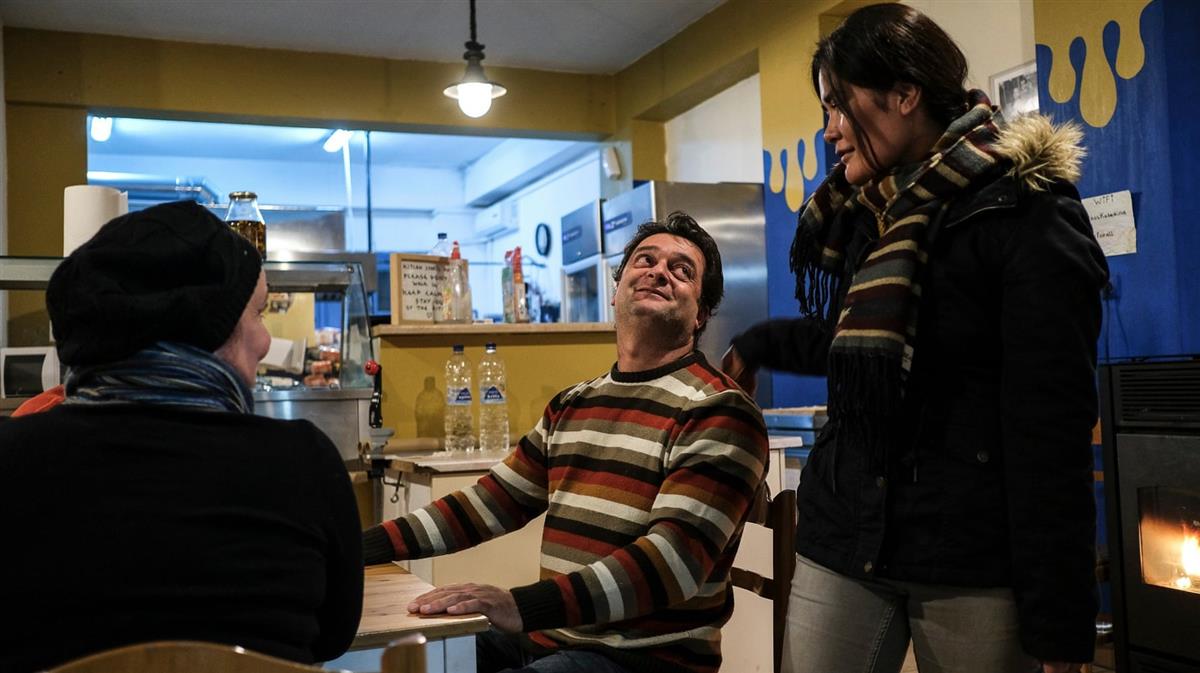 ‘We try to give back what others took from the people’ ... Home for All founders Nikos Katsouris and Katerina Koveou (left) say goodbye to Zakira Naderi, an Afghan asylum seeker. Photograph: Byron Smith/Getty Images
‘We try to give back what others took from the people’ ... Home for All founders Nikos Katsouris and Katerina Koveou (left) say goodbye to Zakira Naderi, an Afghan asylum seeker. Photograph: Byron Smith/Getty Images
That first lot never got their dinner: they were detained by the police before Nikos and Katerina found them. But the couple found another boatload of arrivals to give it to. Ever since, they have been helping refugees, adapting to the changing needs of the situation. When Moria opened, they took sardines, bread, rice and vegetables to the camp and they fed hungry volunteers in their restaurant. Then they started to bring families from the camp to the restaurant. “We try to give back what others took from the people,” Nikos says. “They took their lives, their smiles, their humanity, their dignity. These things we have here.”
It hasn’t gone down well with the authorities. They have broken petty rules, such as that you are not allowed to be a charity and a restaurant at the same time. Nikos and Katerina have been fined a total of €47,800 (£40,000). So they have given up the restaurant and are now solely an NGO, Home for All. They have refugees here every day, to eat, to learn to cook, to be at home, like the boys today. They cook and deliver food for the most vulnerable in the camp – minors and sick people.
Katerina has had to accept that they can’t help everyone. “This was my problem in the beginning – I wanted to help them all. But then I realised: ‘If I do this, probably I am not going to help anyone.’ You help those you can, and if you can do more, you do.”
Why do they do it? “Because we want to and because we can,” she says.
***
I return to Moria one more time, turning off the road where the police bus sits, up the dirt track that runs parallel to the perimeter fence, right into the Jungle. I am not going to Zekria’s library this time, not yet, but to his school, to see one of his teachers.
It has been more difficult for me to talk to women in the camp than to men, mostly because of culture and tradition. No problems with 19-year-old Azita Barekzai from Afghanistan, though. She is happy to chat. Her English is good; she is ambitious and wise (I hope that doesn’t sound patronising). When I ask her something I have already asked, she tells me off: “I told you!” She doesn’t want her photo taken, because she has a cold, but in the end she relents. I am glad there is a picture of Azita; like many of the people I meet in Moria, she is amazing.
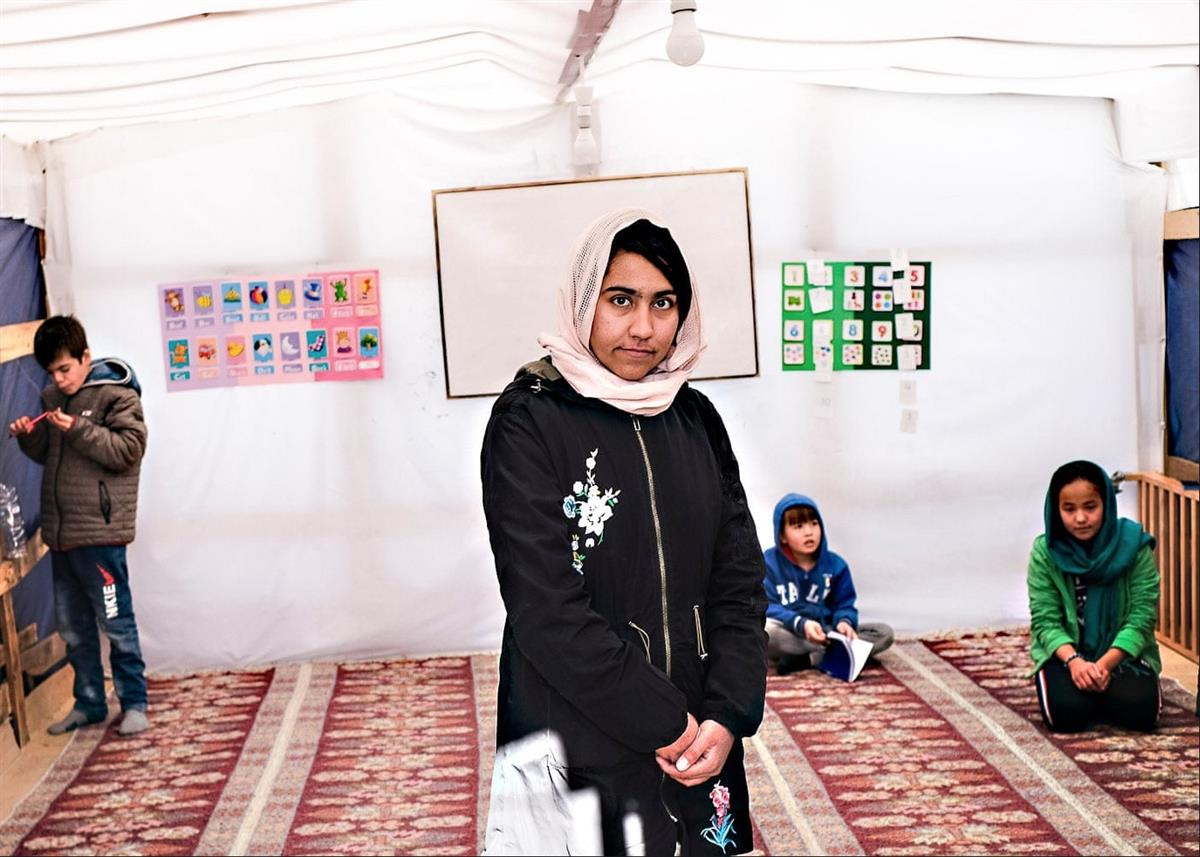 ‘I enjoy it a lot because I can make some people smile’ ... Azita Barekzai, a 19-year-old Afghan English teacher, poses inside a classroom at the school founded by Zekria Farzad. Photograph: Byron Smith/Getty Images
‘I enjoy it a lot because I can make some people smile’ ... Azita Barekzai, a 19-year-old Afghan English teacher, poses inside a classroom at the school founded by Zekria Farzad. Photograph: Byron Smith/Getty Images
She got here seven months ago, with her parents and her three siblings. She is the oldest of the kids. The crossing was terrifying, “really dangerous. I never thought we were going to survive.”
Then she was shocked by what they had come to in Moria. The usual issues – the cold, the rubbish, the fights, being too scared to leave the tent at night. It is especially horrible when it rains. “You cannot imagine how people tolerate it. Life is really difficult here.”
She wants to go to Switzerland, because she heard it accepts refugees and is beautiful. She would like to be a doctor. She has her papers already; she can travel, but the rest of her family hasn’t been approved. They are still waiting.
In the meantime, she is teaching English to kids in Zekria’s school. “I enjoy it a lot because I can make some people smile. I just want to make them laugh. I know that if someone laughs it doesn’t mean they don’t have problems. We need hope. Everyone – especially children – needs hope. We are really hopeless sometimes because of this bad situation. Maybe learning English gives them some hope for the future. They can go somewhere else better.”
It is time for the library’s opening ceremony next door. There is a small gathering; someone has brought a basket of sweets and a red ribbon. Zekria says a few words, thanks the people who nailed the bits of wood together and attached the tarpaulins, and the book donors. Then, with a pair of scissors, he cuts the ribbon. Moria’s library is, he declares, officially open.
***
A couple of weeks later, back in my nice, safe, warm office, I WhatsApp Zekria to check a couple of things. First, he tells me that the pictures I took of the opening (Byron wasn’t around at the time) were terrible. He is not wrong. Then he says his asylum application was rejected again. Fearing deportation, he and his family managed to get to mainland Greece, where they are staying in a squat. “It’s cold, there is no electricity, it is the life of refugees,” he says. “I hate the fucking politics of the world.”
He has no money left and will try to find informal work, then perhaps try to cross a land border into Albania or Macedonia. The library and the school in Moria are fine, he says. The team is running them; he is in touch regularly. “I have to go,” he says. “We will speak later, my friend.”
SOURCE: THE GUARDIAN